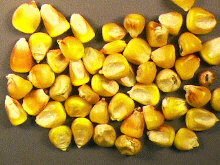Michael Fumento
Factual · Powerful · Original · Iconoclastic
Biotech's Allergy Benefits
January 01, 2000 · Michael Fumento · the Washington Times · BiotechWhere’s that talking Chihuahua when you need him?
If he hadn’t been sent to the old dogs home with Benji and Spuds Mackenzie, he’d be shaking his head at the furor over Aventis’ StarLink corn and saying, "Drop the baloney!"
It began back in September when it became known that the corn, for which Aventis had only sought permission to sell as livestock feed, had managed to sneak its way into Taco Bell taco shells and some other products.

A casualty of the StarLink scare
But the media and biotech bashers have managed to keep it in the headlines, such as: "Allergy-Causing Taco Bell Taco Shells Found in Groceries" and "Alarm at ’Harmful’ GM Corn in Snacks."
The fear that StarLink corn would cause terrible allergic reactions led to a major recall, involving Kraft Foods, Safeway, Kroger, Albertson’s, Food Lion and others.
Worse yet, it’s interrupting our vital supply line of Cheetos, as the Frito-Lay company carefully inspects its corn meal to ensure it hasn’t the least hint of StarLink about it.
But it’s all a tempest in a taco shell.
There was never reason to think the shells and the corn meal that went into them were allergenic or harmful in any way.
Rather, unlike the rest of the biotech corn that blankets America’s heartland and that we’ve all been eating for five years now, the added gene in StarLink produces a protein not rapidly digested in the human gut.

Scores of people die each year from peanut allergies...
A protein that does rapidly break down has little chance of causing harm even if it is an allergen. Speed of digestion is only important because a protein that breaks down slowly could cause harm if it’s an allergen.
But the StarLink sequence of amino acids, the main component of proteins, resembles no known allergens, so it isn’t likely to be one.
Further, below a certain threshold, no allergen causes reactions. In the taco shells they were discovered in, only about 1% of the sample contained the StarLink corn.
The theoretically harmful protein contained in that 1% would be far tinier still, almost certainly below any level that would trigger an allergic reaction. Furthermore, Aventis has submitted to the EPA data showing the protein does not affect people that are allergic to other substances.

...but there has never been a single documented allergic reaction to biotech food.
Meanwhile, when I checked the FDA voluntary recall web page listing the recall of Taco Bell shells, I found no fewer than 15 other food recalls in the previous 60 days, including four expressly recalled because of possible real allergen contamination.
You almost certainly heard about none of those, because none involved biotech.
But if you’re really concerned with food allergies, you should welcome biotech crop technology.
For one, companies that submit biotech foods for approval for human food have to show proof of non-allergenicity. Other crops need no such proof, and sometimes they do provoke allergies.
For example, Kiwi fruit, when introduced into the U.S. in 1986, had already been documented as a cause of allergies as serious as anaphylactic shock. Indeed, each year in the U.S., food allergies cause 2,500 emergency room visits and 135 deaths.
Peanuts are such a common allergen that many school cafeterias have banned peanut butter.
But biotech can even be used to make allergenic foods non-allergenic, or less allergenic, by "switching off" certain genes or by other means.
This isn’t theory; it’s being researched now.

"There are several approaches," Roy Fuchs, regulatory science specialist at Monsanto Co. told me. "There’s work on rice and on peanuts and soybeans using antisense — turning off the gene that produces the allergenic protein — that can reduce but probably not eliminate the source of allergenicity."
Scientists are trying to remove allergy-producing proteins from foods without changing the texture and flavor. Fuchs cites ongoing experiments to disable the offensive gene in potatoes without making fundamental changes. If it still rolls like a spud and tastes like a spud — it’s a spud.
Bioengineering is also tackling food intolerances, which can cause very nasty illnesses.
The protein gluten — found in wheat, rye and barley — causes celiac disease, associated with chronic diarrhea.
It strikes as many as 1 in 250 Americans and Europeans, wreaking havoc in their intestines. But British researchers are working on a process to leave intact most of the gluten while removing the small portion that causes the illness.
Lactose intolerance affects about 90% of Asians, 75% of all blacks and many whites who lack the enzyme lactase, which breaks down the lactose protein in milk. A French medical team is trying to fix the problem by injecting cows with a gene to make their own lactase that would be expressed in their milk — and passed on to people.
If that little dog were still here, he’d be yelping, "Yo quiero biotech!"
